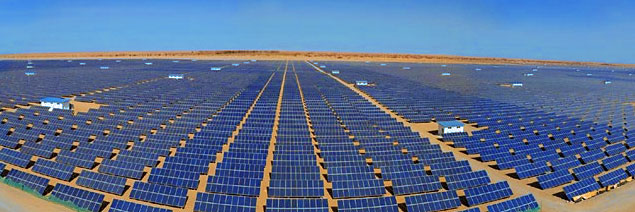CSun did not disclose the terms of the arrangement, which chairman Tingxiu Lu hailed as a “milestone” in its efforts to expand its share of the Chinese solar market. The agreement could prove to be beneficial for the group, which has struggled in recent years, culminating most notably with the de-listing of its shares from the Nasdaq exchange in March 2016.
SPIC was operating about 7.1 GW of solar capacity by the end of December, in addition to nuclear, thermal, hydroelectric and wind assets, according to a statement on its website. Its biggest PV projects in China include a 500 MW installation in Golmud, Qinghai province. It has also integrated a 66 MW solar array with an aquaculture business spanning a lake and intertidal area in Jianhu county, Jiangsu province.
In addition, the Beijing-based power group claims its production facilities in Xining, Qinghai province, are capable of producing 2,500 tons of polysilicon per year. It also owns factories in Xi’an, Shaanxi province, that can annually produce 200 MW of PV cells and 200 MW of solar panels. Its registered capital stood at CNY 45 billion ($6.5 billion) at the end of 2016, with CNY 866.1 billion of assets in China and foreign markets such as Japan, Australia, Turkey, Brazil and Pakistan.
Despite its recent struggles, CSun announced plans in February to open a fully automated 400 MW solar module factory on the site of a former air force base near Sacramento, California. It is set to launch production at the facility this month. The new plant will join CSun’s fleet of overseas production bases in Turkey, Vietnam and South Korea.
This content is protected by copyright and may not be reused. If you want to cooperate with us and would like to reuse some of our content, please contact: editors@pv-magazine.com.



2 comments
By submitting this form you agree to pv magazine using your data for the purposes of publishing your comment.
Your personal data will only be disclosed or otherwise transmitted to third parties for the purposes of spam filtering or if this is necessary for technical maintenance of the website. Any other transfer to third parties will not take place unless this is justified on the basis of applicable data protection regulations or if pv magazine is legally obliged to do so.
You may revoke this consent at any time with effect for the future, in which case your personal data will be deleted immediately. Otherwise, your data will be deleted if pv magazine has processed your request or the purpose of data storage is fulfilled.
Further information on data privacy can be found in our Data Protection Policy.